Search
Europe is one step further on its way to regulating the crypto industry.
European Union lawmakers today signed off the Markets in Crypto Assets Regulation (MiCA)—landmark legislation that hopes to regulate the digital asset space within the union.
European Parliament officials voted 28 to 1 in favor of the legislation, which will, if passed in the next vote, require stricter rules for crypto companies.
MEPs from @EP_Economics voted to confirm w/ 28/1 provisional deal on markets in crypto assets #MICA @DrStefanBerger ahead of the final plenary vote
30 June deal details
— ECON Committee Press (@EP_Economics) October 10, 2022
The MiCA bill asks those issuing crypto to publish a “crypto-asset white paper” containing information about their project.
It also asks stablecoin companies to meet capital requirements: such entities will be restricted on how many tokens they can issue if they are not denominated in euros or other currencies used by E.U. member states.
Stablecoins are digital assets that are designed to have a fixed price—unlike Bitcoin or Ethereum—and are often pegged to fiat currencies, such as the U.S. dollar.
The MiCA looks to regulate cryptocurrency mining, too. The bill asks big “crypto-assets service providers” to disclose their energy consumption. Mining cryptocurrencies is an energy-intensive business and cryptocurrencies like Bitcoin have a bigger carbon footprint than entire countries.
The E.U. could also classify NFTs, unique tokens issued on a blockchain that are linked to assets such as artwork, as securities under the new bill, according to University of Kentucky law professor Brian Fyre, who specializes in NFTs and securities law.
E.U. lawmakers have been debating MiCA for over two years now. The economic union is working hard to try and regulate, in the words of MEP Stefan Berger, the “Wild West of the crypto-world.”
The EU Parliament also today passed an anti-money laundering bill that requests crypto transfers include data on the payer and payee.
The bill, which is aligned with the MiCA, asks crypto-assets service providers to provide information to authorities if an investigation is conducted into money laundering and terrorist financing.
European Parliament officials will again vote on final approval of the MiCA legislation later this month before it becomes law.

